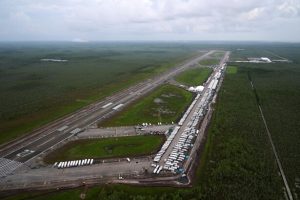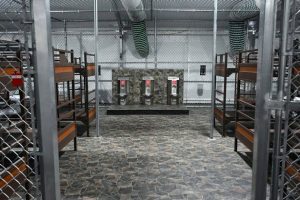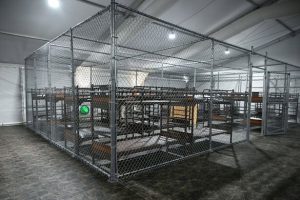A federal judge has temporarily put the brakes on construction of a controversial immigration detention center known as “Alligator Alcatraz” in the Florida Everglades



The Trump administration had to stop construction on their ‘Alligator Alcatraz’ prison as lawyers argue about whether it violates environmental laws.
A federal judge brought construction of a controversial immigration detention center, infamously nicknamed “Alligator Alcatraz” and situated in the heart of the Florida Everglades, to a screeching halt on Thursday amid debates over its compliance with environmental regulations.
While the facility is permitted to continue functioning and detaining individuals for U.S. Immigration and Customs Enforcement, any further development involving new fill, paving, or infrastructure has been prohibited for the next 14 days. U.S. District Judge Kathleen Williams announced the decision during a hearing, with plans to formalize it in a written order later that day.
Environmental groups and the Miccosukee Tribe are urging Williams to impose a preliminary injunction that would halt both operations and further construction at the location.
The lawsuit claims that the detention center threatens the fragile wetlands ecosystem, which provides habitat for protected species and plant life, and could jeopardize the billions spent on environmental restoration projects. Williams questioned Florida attorney Jesse Panuccio, asking if the state would agree to halt construction so she wouldn’t have to issue a restraining order.
She noted that anything built at the site would likely become permanent, regardless of the case’s final outcome.
Panuccio responded that he couldn’t assure that all work would cease. This led to an hour-long hearing about the temporary restraining order, which will remain in effect for the next two weeks while the preliminary injunction hearing continues.
The plaintiffs’ main argument is that the detention facility violates the National Environmental Policy Act, which mandates federal agencies to evaluate the environmental impacts of significant construction projects.
During the hearing, Panuccio argued that although the detention center would house federal detainees, the construction and operation of the facility fall entirely under the jurisdiction of Florida, implying that the NEPA review wouldn’t apply.
Schwiep countered by stating that the facility’s purpose is for immigration enforcement, a function solely within the federal government’s purview. He added that the facility wouldn’t exist without the federal government’s need for a place to hold detainees.
On Thursday, Williams stated that the detention facility was, at the very least, a joint venture between the state and federal government.
A lawsuit has been filed in Miami against both federal and state authorities, marking one of two legal challenges to the South Florida detention center. This facility was constructed over a month ago by the state of Florida on an isolated airstrip owned by Miami-Dade County.
Civil rights groups have launched a second lawsuit, claiming that detainees’ constitutional rights are being violated. They argue that detainees are prevented from meeting with lawyers, held without charges, and bond hearings have been canceled by a federal immigration court.
A hearing for this case is set for Aug. 18.
According to environmental groups and the tribe, under the 55-year-old federal environmental law, federal agencies should have assessed how the construction of the detention center would affect the environment. They should have identified ways to minimize the impact and adhered to other procedural rules such as allowing public comment.
The suit argues that it doesn’t matter that the detention center, which houses hundreds of detainees, was built by the state of Florida. This is because federal agencies hold authority over immigration matters.
Last week, attorneys representing federal and state agencies requested Williams to dismiss or transfer the injunction request. They argued that the lawsuit was filed in the wrong jurisdiction.
Despite the property being owned by Miami-Dade County, they claim that Florida’s southern district is not the correct venue for the lawsuit. This is because the detention center is located in neighboring Collier County, which falls within the state’s middle district.
Williams has yet to rule on this argument.
The legal proceedings unfolded while Florida’s Republican Governor Ron DeSantis’ administration was evidently gearing up to construct a second immigration detention facility at a Florida National Guard training site in the northern part of the state. State documents show that at least one contract has already been granted for what officials are calling the “North Detention Facility.”
Leave a Reply